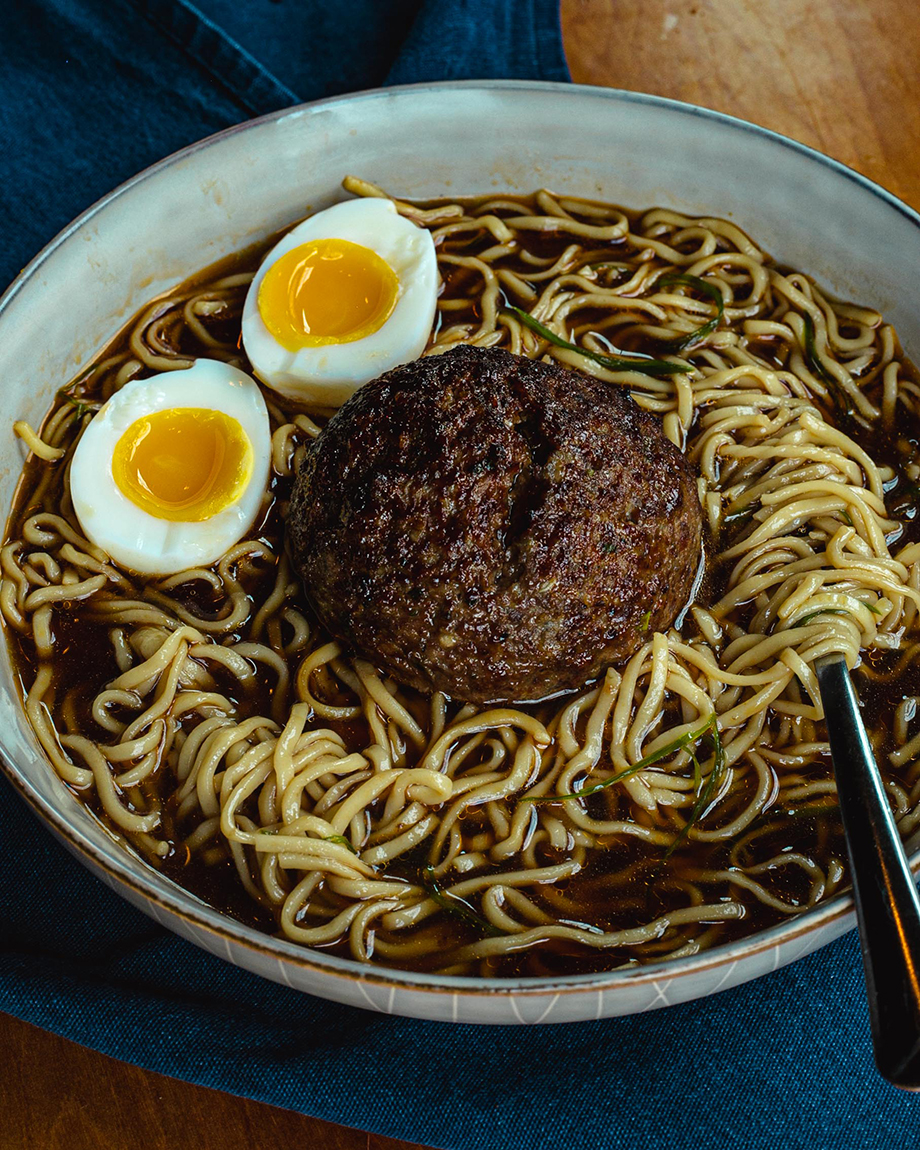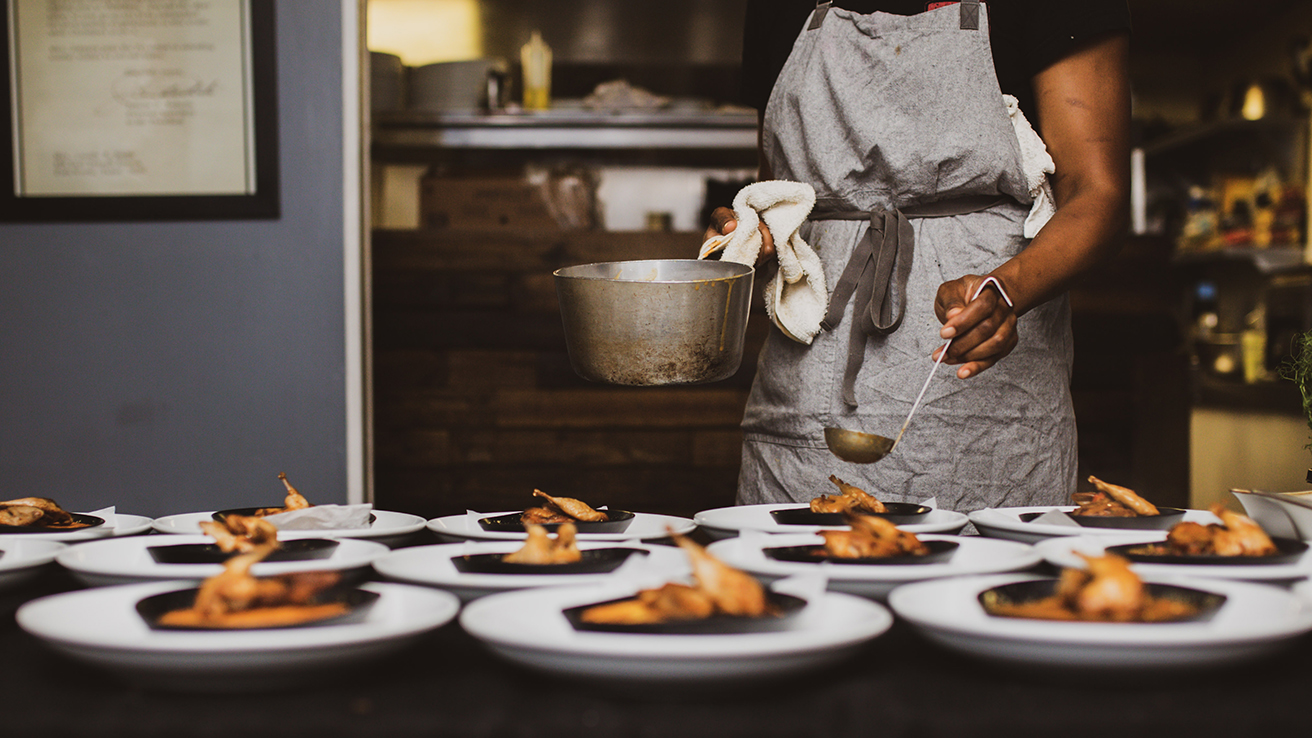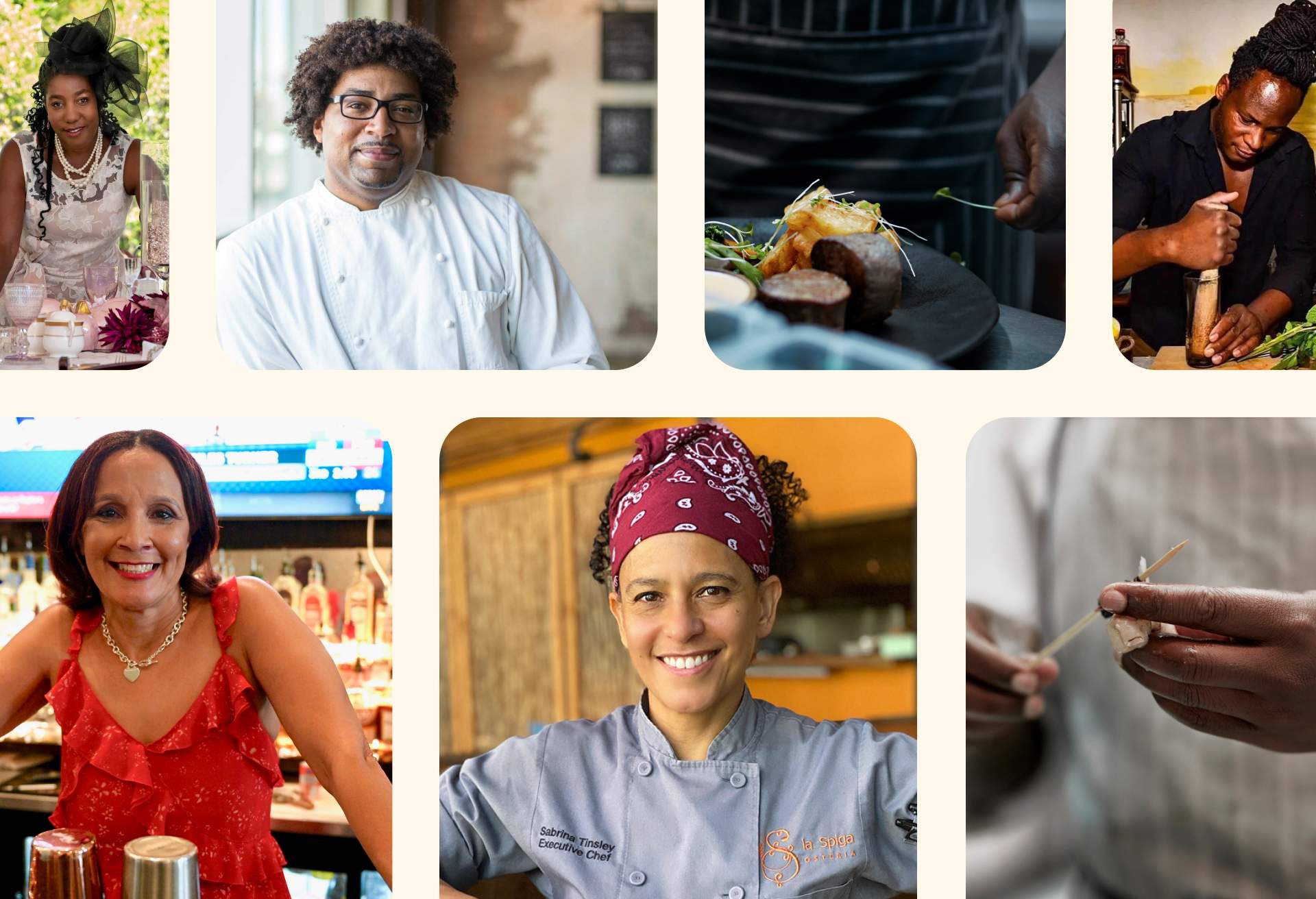When chef Kenyatta Ashford was furloughed from his job last year due to the pandemic, he channeled the spirit of President Barack Obama’s administration, which famously practiced never letting a crisis go to waste.
So Ashford pivoted, creating Neutral Ground restaurant as an opportunity to celebrate the flavors and connection of his New Orleans’ upbringing and travels in West Africa. Located as a pop-up within Proof Bar and Incubator in Chattanooga, TN, Ashford’s menu at Neutral Ground blends traditional New Orleans comfort foods with interpretations that emphasize the impact of Black diasporic culinary traditions, such as calas, savory rice beignets that have roots as a dish 18th-century slaves sold in Louisiana on their days off to earn money toward freedom. Another example is yaka mein, an originally Chinese beef noodle soup that evolved to include Creole spices when it came to the United States.
“Yaka mein is a dish that represents the African American experience; a dish that when it came to the United States in its original form was completely Asian. But today’s riffs speak to the cultural gumbo that makes New Orleans and Louisiana unique. Yaka mein is an emblematic dish from my upbringing in New Orleans,” he says. At Neutral Ground, he serves his yaka mein with a smoked brisket meatball.

“I founded Neutral Ground in the middle of the pandemic despite the ever-changing landscape of the food industry. That has unlocked and unleashed my full creativity to dig into the tastes of my New Orleans upbringing and to explore the foodways of the African diaspora that have inspired my travels and ongoing education as a chef,” Ashford says.
Adaptability like Ashford’s was the name of the game in 2020, particularly in the restaurant industry. Unforeseen changes required chefs to learn new approaches to dining, their menus, and mission to impact the food world. For Black chefs in particular, the onset of the pandemic created an opportunity to continue or reimagine an approach to food rooted in cultural traditions and flavors.
Reservations for Proof Bar & Incubator:
Without the structure and formalities of the traditional restaurant setting, getting back to the heart of food memories set the tone for dishes that represent the flavors of a diaspora that stretches from West Africa to the American south to the Caribbean. Chefs working from pop-up locations, food trucks, and even their home kitchens due to the pandemic no longer had to rely on convincing investors of their concepts to move forward.
Last year’s calls for racial justice included a demand for more equity in all industries, and Black entrepreneurs have always faced bias and hesitation from investors, making receiving capital for projects even more difficult. According to a report by Restaurant Business Online, only 130 Black-owned restaurants received loans over $150,000 from the Paycheck Protection Program last year. This reality of inequitable investments, coupled with a pandemic that demanded flexibility, provided more avenues for Black chefs to pursue their own concepts in earnest.
Recipes passed down through oral tradition that are representative of survival and resourcefulness are the backbone of many Black chefs’ interpretation of food. And while the pandemic dismantled many traditional restaurant models, what it sustained is also what could never be lost: the impact of Black culinary traditions as an integral part of American history.
“Diasporic foods don’t just inform American cuisine — they define it. Without the influence of Africans in kitchens throughout the Americas, the dishes, flavors, and stories we call our own wouldn’t be the same,” Ashford says. “From coastal rice dishes that morphed as they moved across the country to spices and preservation techniques that clearly come directly across the Atlantic from Africa, the names of the cooks who defined American cuisine may be lost, but their heritage is not. To taste or talk about American cuisine without considering the formative influence of African cooks, chefs, techniques, and ingredients is to neglect the very foundation of our nation’s culinary canon.”

For chef Rashida Holmes of Los Angeles’s Bridgetown Roti, 2020 created room for her to build even more on cooking the traditional Caribbean flavor memories of her
childhood. “The pandemic gave me the unique opportunity to showcase what I had been working on for a while in a new way. It’s kind of serendipitous that I had a Black-owned, new West Indian food concept that was focused on simply joyful, freshly made, to-go comfort food at a time when people were really interested in to-go friendly, Black-owned food concepts,” Holmes says. “I feel very lucky that my food was able to reach so many folks so fast and that they enjoyed my interpretation of the kind of comfort food I grew up on.”
The menu at Bridgetown reflects Holmes’s particular experience in America as a person with Caribbean roots. “My mom is from Barbados, and I have family on my dad’s side from Barbados, Trinidad, and Panama, so my Black experience is a Caribbean American experience as well,” she says. On her menu, she includes her Aunt Vie’s codfish cakes, a dish that has been part of her life for as long as she can remember, but also one that she never saw on any other menus.
This balancing of both her Caribbean and Black American experiences represents a diasporic story that isn’t limited to just one narrative. She remembers a sixth grade stew competition where she won best taste for her curry chicken — but lost best overall because the judges deemed her dish not “technically a stew.”
“I guess what inspired me to take these dishes and turn them into menu items was a desire to tell my Black culture story, to help people understand what that means to me, and that Black culture doesn’t have one definition — it’s a collection of our individual stories,” she says. At Bridgetown, Caribbean cuisine shines with dishes like a flaky oxtail patty and red pepper smoked goat served inside roti with roasted peanut sauce, fried potatoes, and turmeric-spiced slaw.
This movement isn’t just limited to Ashford or Holmes: Black chefs across the country are seizing this moment to celebrate and honor their diasporic heritages. Top Chef judge Gregory Gourdet is currently hosting a pop-up in Portland, Kann, that explores his Haitian heritage; South Carolina’s Ashleigh Shanti, who’s known for highlighting African and Appalachian traditions in food, is starting her own hospitality group; and in Boston, despite having to delay their opening of the Comfort Kitchen, a restaurant focusing on comfort food with flavors from the African diaspora, the team was still able to connect with the community this year through YouTube videos, pop-ups, and more. They’re all following in the footsteps of big-name chefs such as Nina Compton, Edouardo Jordan, and Mashama Bailey — all James Beard Award winners — who have done the same at their New Orleans, Seattle, and Savannah restaurants, respectively.

For James Beard Award-nominated chef Dawn Burrell, the pandemic was a moment to pursue more personal goals related to her heritage. Following two years as the head chef of Kulture restaurant in Houston, Burrell left the restaurant where she made her name and used the opportunity to launch PIVOT, a chef-driven meal preparation service dedicated to assisting families with wholesome food options through meal kits, prepared meals, and custom culinary planning — while also financially empowering female chefs. “PIVOT offers restaurant-quality meals from my life experiences and dishes that are near and dear to me. It has served as a platform for me to share my culture and history with my audience,” Burrell says.
Influences of West African flavors are evident in many of Burrell’s dishes. Some of her favorite creations at PIVOT have included fermented green peri-peri vinaigrette; suya-dusted turkey osso buco with dirty risotto; jerk octopus; and ham hock dashi. “My goal is to always reflect how diverse pan-African cuisine is. Pan-African cuisine can be as elevated, beautiful, and display skill and technique as much as any other celebrated cuisines. I channel these points in everything I make,” she says.
Reservations for Kulture:
This interpretation and celebration of diasporic foods will continue to be embraced by Black chefs navigating today’s new landscape. Dishes that have survived centuries, crossed continents, and represent a pride in identity are a central part of not only their history, but also the entire country’s history.
“America’s food traditions are all wrapped up in the immigrant stories of folks that came, willingly and unwillingly. There are a lot of young people of color who have worked in European-centric kitchens who want to represent their heritages and be taken seriously for it,” Holmes says. “The fact that the first Black woman [Nina Compton] to win the James Beard Award [for Best Chef: South] wasn’t until 2017 is a tragedy considering the cultural impact Black women have had on the history of food in this country. So consider us, listen to us, and respect what we are saying about our food and ourselves.”

Kristin Braswell is a journalist and founder of CrushGlobal Travel, a company that customizes travel guides and authentic experiences around the world.




